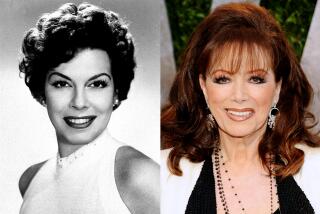Book for Smart Women About Stupid Men
Publishing in the 1980s has produced a series of blockbuster best sellers advising women how to cope with men. In most of these books men have not been portrayed as desirable mates but as abominable necessities.
The titles betray the contents: âWomen Men Love, Women Men Leave,â âMen Who Hate Women & The Women Who Love Them,â âWomen Who Love Too Much: When You Keep Wishing and Hoping Heâll Change,â âHow to Love a Difficult Man,â âMen Who Canât Love,â âSuccessful Women, Angry Men,â and âThe Peter Pan Syndrome: Men Who Have Never Grown Up.â
Few if any such books are aimed at men, because itâs women who buy books.
As a man, I am not offended by this trend; men have held the advantage over women for so long that we must expect the tables to be turned. Also, there is a lot of truth in some of them. Most men are selfish , domineering , thoughtless and infantile .
Inevitably, though, this moneymaking stream of psychobabble had to turn up a parody. Price Stern Sloan has published one called âSmart Women, Stupid Books: Stop Reading and Learn to Love Losers,â by Lisa Ann Marsoli and Mel Green.
It begins with an injunction that is probably as sound as any in the other books of the genre: âMen are stupid and smart women know it. Itâs time to stop worrying and start enjoying them for what they are--which will always be less than you want.â
The book is addressed mostly to Overachieving Women (Ows), and the authors are unabashed in suggesting the kind of men they might try for. For example, the Convenient Man--a musician and part-time electrician who not only makes âastonishingâ love but also repairs the Owâs blender and alphabetizes her entire record collection.
They also suggest Close Relatives, such as oneâs brother-in-law, oneâs auntâs husband, oneâs stepbrother, and oneâs cousins and nephews. After all, theyâre around.
The Married Man is also a possibility. He wonât demand too much of oneâs time or eat too much of oneâs food. âUsing the married man is simply a matter of scheduling, discretion and contraception.â
They also recommend Younger Men, who are âfresh, exuberant, have stamina and are easy to fool,â and that old standby, the Sugar Daddy--âGreat gifts, good meals, bad sex.â
Even relationships with transvestites are not to be despised. The story is told of Deby B., 34, a professional body builder whose pickup, Earl, a shoemaker, left her bed to go to the bathroom and came back wearing a taffeta cocktail dress. Deby let go of her ârigid concepts of the male roleâ and found in Earl âa man she can respect and a woman she can confide in.â
But women are warned against the Perfectionist. We are told of Anna K., 34, a successful furrier, who took up with Charles, an official in the Department of Weights and Measures. After dinner he rearranged her spices by geographical origin and interrupted their lovemaking with a sudden concern over the fiber count in Annaâs sheets. âI find it difficult to be aroused on a blend,â he said.
Numerous womenâs roles are described, including the Mystery Woman: âThe film noir effect can be achieved by speaking with a husky voice, speaking in monosyllables only and using words from foreign languages like si , ciao and croissant . Donât shave your legs or under your arms; smoke lots of cigarettes and look bored . . . and you can change your name from Ruth to CoCo.â
The authors describe themselves as chiropractors who got divorced to save their practice, but that is obviously part of the put-on. This is pure farce, but Iâm not sure it is any less useful than the books it parodies.
Meanwhile, I have a letter from Glenn Krell of San Francisco enclosing an ad from The Times for a book called âLoving a Younger Man: How Women are Finding and Enjoying a Better Relationship,â by Victoria Houston.
It says, âEverything in your life can be better . . . from sex to self-esteem. For women from 25 to 80, younger men are proving to be sensuous, thoughtful and deeply committed partners. . . .â
Krell wonders what kind of outcry that ad would inspire if the word man were changed to woman and woman to man . How would âLoving a Younger Womanâ sell?
Oh, well, as I say, itâs their turn.
More to Read
Sign up for our Book Club newsletter
Get the latest news, events and more from the Los Angeles Times Book Club, and help us get L.A. reading and talking.
You may occasionally receive promotional content from the Los Angeles Times.






